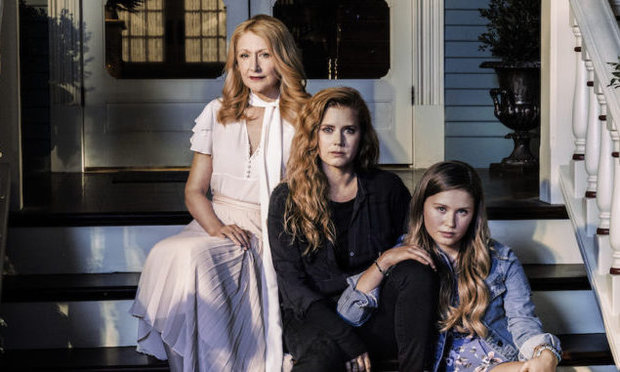Murder mystery aside, ‘Sharp Objects’ is fundamentally about women at their worst and the trauma that brought them there.
(Note: Spoilers ahead!)
A few Sunday nights ago, when my boyfriend and I sat down so that he could catch up on the Sharp Objects episodes he had missed, I burned my hand on a hot pan. We turned off the TV and rummaged through all available first aid options while I watched the skin on my thumb turn white and start to bubble.
It was a fitting metaphor for a show so raw, a show that gradually peels back layers of sexual violence, self-harm, and alcoholism to tease us with what’s underneath. Sharp Objects, a miniseries adapted from the Gillian Flynn novel of the same name, turns to HBO’s 2017 triumphant Big Little Lies and says, “Hold my beer.” Starring Amy Adams, Patricia Clarkson, Elizabeth Perkins, and newcomer-to-watch Eliza Scanlen, this is the latest drama series driven by a female ensemble cast, and the second HBO series in two years with character development just as important, if not more so, than its advertised murder mystery.
We’ve come a long way in the last decade or two, from expecting female leads to play second fiddle to their male counterparts while shelving their own needs and desires. Natalie Portman in Garden State, Kirsten Dunst in Elizabethtown, and Zoey Deschanel in 500 Days of Summer gave us the Manic Pixie Dream Girl, a quirky female stock character whose sole purpose is to help the male protagonist achieve his wildest dreams. Now film and TV are showing that women can be messy, and not in the adorable and endearing MPDG way. Women are behaving badly. Women are making us uncomfortable.
Sharp Objects’ protagonist, Camille, has not returned to her hometown of Wind Gap, Missouri, to wow anyone with tales of life in the big city. Really, she’s not here to impress anyone at all. Camille is a journalist sent on assignment to cover a recent pair of murders in the town, and gets through each day on graphic sexual fantasies and bags of vodka miniatures. Her hair hangs limply in front of her makeup-less face. When handsome detective Richard Willis (Chris Messina) leans in for a kiss in episode four, she turns her lips away and shoves his hand down her pants.
Unlike “Amazing” Amy Elliot Dunne from Gillian Flynn’s last novel adapted for screen, Camille doesn’t care about outward appearances. She seems hardened to how unwelcome she is in Wind Gap, especially by her mother Adora (Patricia Clarkson) who regards her daughter as a pox on the town. “You smell ripe,” Adora growls after Camille comes home from her tryst in the forest. Meanwhile, Camille is alternatively loved on and tortured by her younger half-sister Amma (Eliza Scanlen) who confesses that she’s “not a nice girl.” Lest Camille believe for a second that she’s found a true friend here.
Why bother with a show where all the characters are so miserable and unlikeable? Murder mystery aside, Sharp Objects is fundamentally about women at their worst and the trauma that brought them there. What keeps me and 2 million other viewers coming back for more isn’t so much the tension between the characters as the question of why it exists in the first place. Adora hates Camille so intensely because of something to do with the death of Camille’s sister, and her extravagant affection toward Amma is both a way for Adora to keep herself afloat and another intolerable sight driving Camille to self-destruction. Sharp Objects sifts through the layers of Wind Gap’s painful secrets like sand.
My friend Sam Eyler once wrote that “the central premise of feminism is that patriarchy stifles any form of public protagonism by women,” meaning that naturally, when we create shows with fleshed-out female leads with their own backstories and motivations, “space for more female heroes opens a corresponding space for more female villains.” One of the things I appreciate most about Sharp Objects is that it plays with our ideas of good and evil. Everyone in Wind Gap uses masculine pronouns to refer to the killer, though the audience suspects differently now that the series is five episodes in. Amma, first presented to us as a sweetheart with bright eyes and hair ribbons, spends her free time popping pills and creating nasty memes to cyberbully classmates with. In episode four, Adora tells Camille that she was “always so willful; never sweet.” Willful: a word with a negative and disobedient connotation that actually means deliberate, intentional, acting with agency. Is Camille deservedly scorned, and as Adora tells her in episode five, “ruined”? Or is she a woman who acts outside of what was determined for her?
When we finally saw Camille stripped down to her skivvies last Sunday, her scars put my little thumb burn to shame. “Every woman gets a label if they don’t conform,” Camille says to Richard. Her line distills Sharp Objects into a chicken-or-egg question of labels, behavior, what came first, and how one will continue to inform the other as the series reaches its conclusion.
Chelsea Cristene is an international student adviser, English professor, and graduate student based in Washington, DC. She has been published by the Good Men Project, Salon, xoJane, The Establishment, and MamaMia, and has appeared on HuffPost Live. Find her on Twitter.
Other Links:

